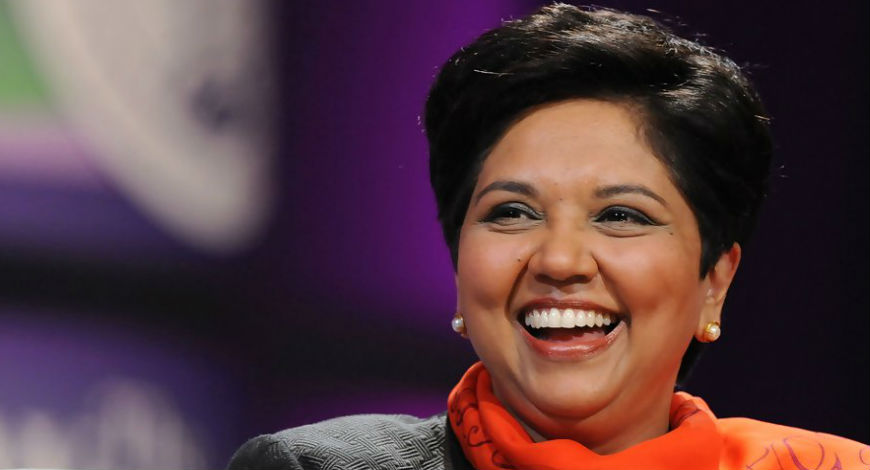
The debate about the lack of female representation in STEM continues, but other sectors are in dire need of more female representation.
Even though statistics show that more women than ever before are earning graduate business degrees from US business schools, women continue to struggle in the corporate world to compete on an equal footing with their male counterparts.
According to a report, women in the United States who have earned an MBA receive a 63 percent pay raise, but the gender pay gap with men remains large and gets worse over time.
The disparity is even greater for minority female business leaders. According to the study, estimated wages for non-minority males are 52 percent lower than for non-minority males.
Despite this disparity, women should not be discouraged from pursuing a degree in Business Leader or making their way up the corporate ladder.
Let’s have a look at some of the business leaders:
Indra Nooyi
Nooyi became a senior vice president of business planning and growth at PepsiCo in 1994. She became the company’s president and chief financial officer in 2001. Nooyi oversaw a major restructuring that involved the company’s restaurants—which included KFC, Pizza Hut, and Taco Bell—being spun off into Tricon Global Restaurants (which later became Yum! Brands, Inc.), as well as PepsiCo’s bottling operations being spun off.
She also oversaw the purchase of Tropicana Products in 1998 and a merger with the Quaker Oats Co. in 2001 as part of the company’s plan to diversify into more healthful beverages and foods.

In October 2006, Nooyi was named CEO, and the following year, he was also named chairman of the board. Nooyi, PepsiCo’s fifth chairman, and CEO in the company’s 42-year history, was the first woman to lead the soft-drink and snack-food behemoth and one of only 11 female business leaders in the Fortune 500.
Although some observers were surprised by Nooyi’s appointment (her predecessor, Steven Reinemund, had only been chairman for five years before suddenly resigning), many admired the skills she would bring to the job. She also sought foreign expansion with vigor. PepsiCo’s sales rose from $35 billion in 2006 to $63.5 billion in 2017 under her Business Leadership. The following year, Nooyi announced that she would step down as CEO in October and as chairman of the board of directors in early 2019.
Madam CJ Walker
She experimented with various commercial hairdressings and developed her formula to treat scalp infections that resulted in baldness. She worked as a sales agent for Annie Turnbo, the Poro Company’s founder, for about two years.
She worked as a cook for a pharmacist after moving to Denver in 1905, where she studied the basic chemistry that enabled her to perfect an ointment that healed dandruff and other hygiene-related ailments that were prevalent at a time when most Americans did not have indoor plumbing.
In the year 1906, she got married to Charles Joseph Walker and started with the promotion of the “Walker Method” or “Walker System of Beauty Culture” in her native land. From that time onwards she had been known as Madam C.J. Walker
She continued to grow her business by moving across the country and offering employment opportunities and financial freedom to thousands of African American women who would otherwise have been forced to work as maids, chefs, laundresses, and farmhands.
She traveled to The Caribbean and Central America in 1913, expanding her international reach. She reported 25,000 successful Walker sales agents by 1919.
Also Read: Women Entrepreneurs Are Shaping The Future Of Global Business
Irene Rosenfeld
Rosenfeld began her career at an advertising firm before joining General Foods Corporation’s marketing department in 1981. The company produces a wide range of packaged and frozen items, including Kool-Aid fruit-flavored drinks, Maxwell House coffee, and Oscar Mayer meats. She rose through the ranks of the company over the next 15 years, overseeing a variety of its labels.
In 1985, tobacco giant Philip Morris (now the Altria Group) purchased General Foods, and over the next decade, it was integrated with another of Philip Morris’ acquisitions, Kraft Foods, a frozen cheese maker that had also acquired several food products lines.
Rosenfeld was promoted to head of Kraft’s entire Canadian division in 1996, broadening her marketing expertise beyond a particular brand or form of a food product. She also assisted in the integration of Nabisco’s biscuit products into Kraft Foods after Philip Morris acquired the company in 2000, and she was a member of the committee that prepared Kraft for its initial public offering in 2001.
Ursula M. Burns
Burns joined Xerox as a full-time employee in 1981 after finishing his master’s degree and rapidly rose through the ranks of product creation. She rose through the ranks of management and engineering from 1992 to 2000, when she was named senior vice president of corporate strategic services, where she supervised production operations.
Burns was appointed president of Xerox in 2007. After the appointment, she expanded her leadership in the areas of global research, product growth, marketing, and delivery. She was elected CEO two years later and chairman of the board in 2010.
These are some of the most impactful women across the globe who brought a revolution in the so-called “men’s world.” Their robust business sense and farsighted nature changed the way any business operates.
- How to Succeed in MBA Entrance Exams 2025: Secrets and Strategies - January 18, 2025
- Challenges of Integrated Marketing Communication - October 27, 2024
- What Does A Business Development Manager Do? - April 8, 2024
